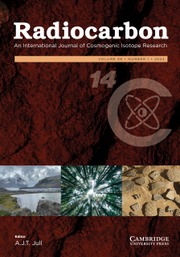Article contents
Evaluating the Reliability of AMS Dates on Food Residue on Pottery from the Late Prehistoric Central Plains of North America
Published online by Cambridge University Press: 19 January 2016
Abstract
Age offsets of accelerator mass spectrometry (AMS) assays on food residue taken from pottery vessels are well-documented in Europe and Asia in cultural contexts were freshwater aquatic products are attested, but are less well studied in North America. The present study examines a series of residue dates from the late prehistoric Central Plains of North America, comparing them with context dates run on annual plant remains. At least 13 of 23 assays are either incongruent with ages on annual plant remains, inconsistent among themselves within a site, or not credible for their cultural context. The conclusion is that food residue from ceramics does not produce consistently accurate dates. Some possible factors that may serve to introduce old carbon to residue samples are discussed. It also is noted that one's conclusions about the reliability of residue may be conditioned by the precision of the age determinations and by the goals of a specific chronology-building effort.
- Type
- Articles
- Information
- Copyright
- Copyright © 2013 by the Arizona Board of Regents on behalf of the University of Arizona
References
REFERENCES
- 2
- Cited by


